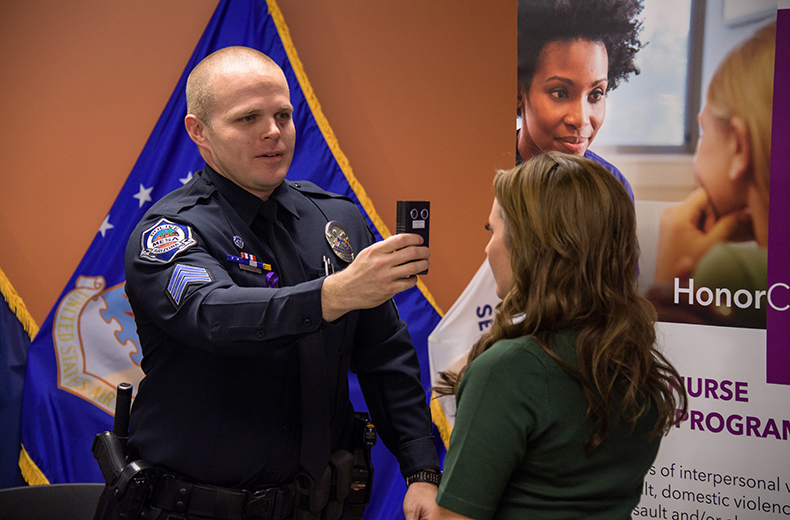
Police Officers Can Identify Concussion Signs in Victims of Domestic Violence and Transport for Care

A new report revealed the unique role police officers can play in detecting and providing more comprehensive medical care for victims of domestic violence who suffer a possible head injury.
The report, which was led by the Mesa Police Department, the University of Arizona College of Medicine – Phoenix, The CACTIS Foundation and the Maricopa County Attorney’s Office, was published August 16 in the Journal of Aggression, Maltreatment and Trauma. It explored the involvement of police departments in early identification of concussion signs during domestic violence calls.
“This partnership makes police departments more aware and able to respond in a trauma-informed manner,” said Jonathan Lifshitz, PhD, director of the Translational Neurotrauma Research Program at UA College of Medicine – Phoenix and Barrow Neurological Institute at Phoenix Children’s Hospital. “In the acute setting, the victim is in crisis. Awareness is critical to provide the support necessary to help the individual receive the care they need. This is an opportunity to recognize acute symptoms of traumatic brain injury (TBI) and encourage immediate care.”
This is the first time that a process has been tested to involve police departments in identifying and serving victims of domestic assault that may have suffered TBI. The opportunity is missed if officers dismiss concussion signs – avoiding eye contact, trouble finding words, illogical thinking – as being dismissive or uncooperative. When signs are recognized, the officers can intervene. The study provides a framework for other police departments to initiate and replicate these ongoing efforts by the Mesa Police Department. The Tempe Police Department has followed suit.
The City of Mesa has about 200 domestic violence calls every week, and nationwide, 12 million women and men are victims of domestic violence each year.
In late 2016, the Maricopa Attorney’s Office contacted the Mesa Police Department to investigate incidences of TBI during domestic violence and sexual assault events. The intent was to educate police officers about the signs and symptoms of TBI and to create best practice guidelines to provide care for victims with TBI from domestic violence as early as the initial police encounter.
The team implemented a protocol with the Mesa Police Department that when first contact with the victim is made by a police officer, the officer advises the patient that during these types of violent events, it is possible they may have experienced a concussion. The officer asks the victim if they would complete a short screening test to assist medical personnel in the diagnosis of a concussion from the encounter. If the patient consents, the officer retrieves a small handheld device to measure near point convergence, a common visual abnormality in patients with concussions. The officer records the consent and results after successful completion of the test. At a later time, supervisors retrieve data from the encounter for researchers to combine with results obtained by the forensic nurses and neurological follow-up.
Victims also have access to rapid and appropriate medical care through a large network of collaborators and providers, including a medical exam at a forensic nursing facility, immediate shelter at the Sojourner Center when requested, and a patient advocate to encourage follow-up treatment for possible sustained or new neurological symptoms.
“The education and the insight about the frequency of TBI in the domestic violence population is new for police departments,” Dr. Lifshitz said. “We recognize that TBI signs and symptoms may complicate police work, and awareness allows better delivery of services. Many approaches to engage police departments are met with resistance, but the opportunity exists to accomplish the mission of serving citizens.”
Dr. Lifshitz and Hirsch Handmaker, MD, both faculty at the College of Medicine – Phoenix, led the study along with Lt. Mark Higbee of the Mesa Police Department, and Jon Eliason and Hilary Weinberg of the Maricopa County Attorney’s Office.
“We were unaware of any prior programs addressing what a police officer needs to know in the event a victim has sustained a concussion,” said Dr. Handmaker, who is also chairman and CEO of The CACTIS Foundation, an organization focused on advancing the diagnosis, treatment and prevention of TBIs. “Through this remarkable relationship with the Mesa Police Department and the Maricopa County Attorney’s Office, we set forth to do something about this nationwide epidemic and look at the specific signs and symptoms of concussions in victims of domestic violence.”
About the College
Founded in 2007, the University of Arizona College of Medicine – Phoenix inspires and trains exemplary physicians, scientists and leaders to advance its core missions in education, research, clinical care and service to communities across Arizona. The college’s strength lies in our collaborations and partnerships with clinical affiliates, community organizations and industry sponsors. With our primary affiliate, Banner Health, we are recognized as the premier academic medical center in Phoenix. As an anchor institution of the Phoenix Bioscience Core, the college is home to signature research programs in neurosciences, cardiopulmonary diseases, immunology, informatics and metabolism. These focus areas uniquely position us to drive biomedical research and bolster economic development in the region.
As an urban institution with strong roots in rural and tribal health, the college has graduated more than 1,000 physicians and matriculates 130 students each year. Greater than 60% of matriculating students are from Arizona and many continue training at our GME sponsored residency programs, ultimately pursuing local academic and community-based opportunities. While our traditional four-year program continues to thrive, we will launch our recently approved accelerated three-year medical student curriculum with exclusive focus on primary care. This program is designed to further enhance workforce retention needs across Arizona.
The college has embarked on our strategic plan for 2025 to 2030. Learn more.